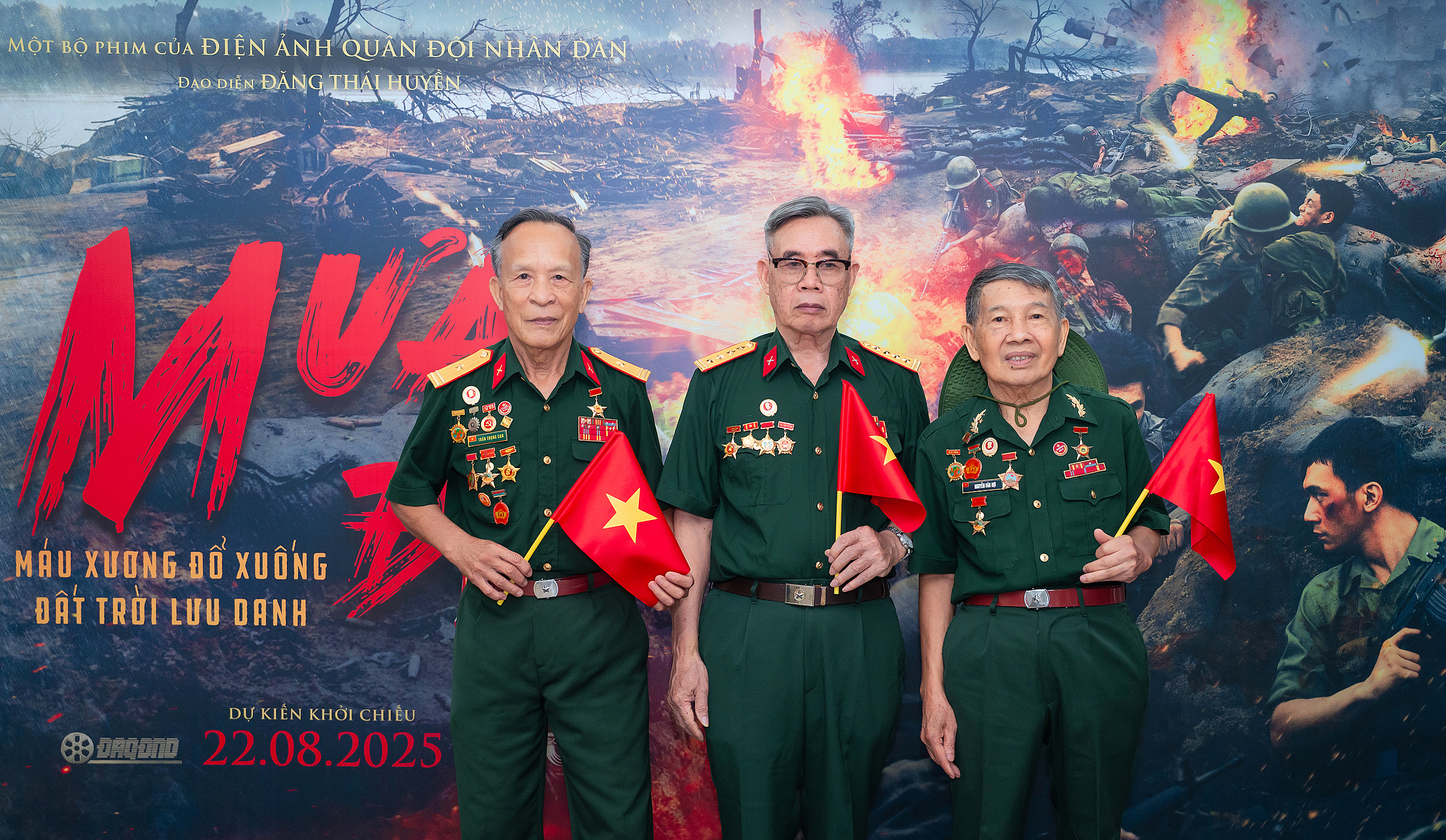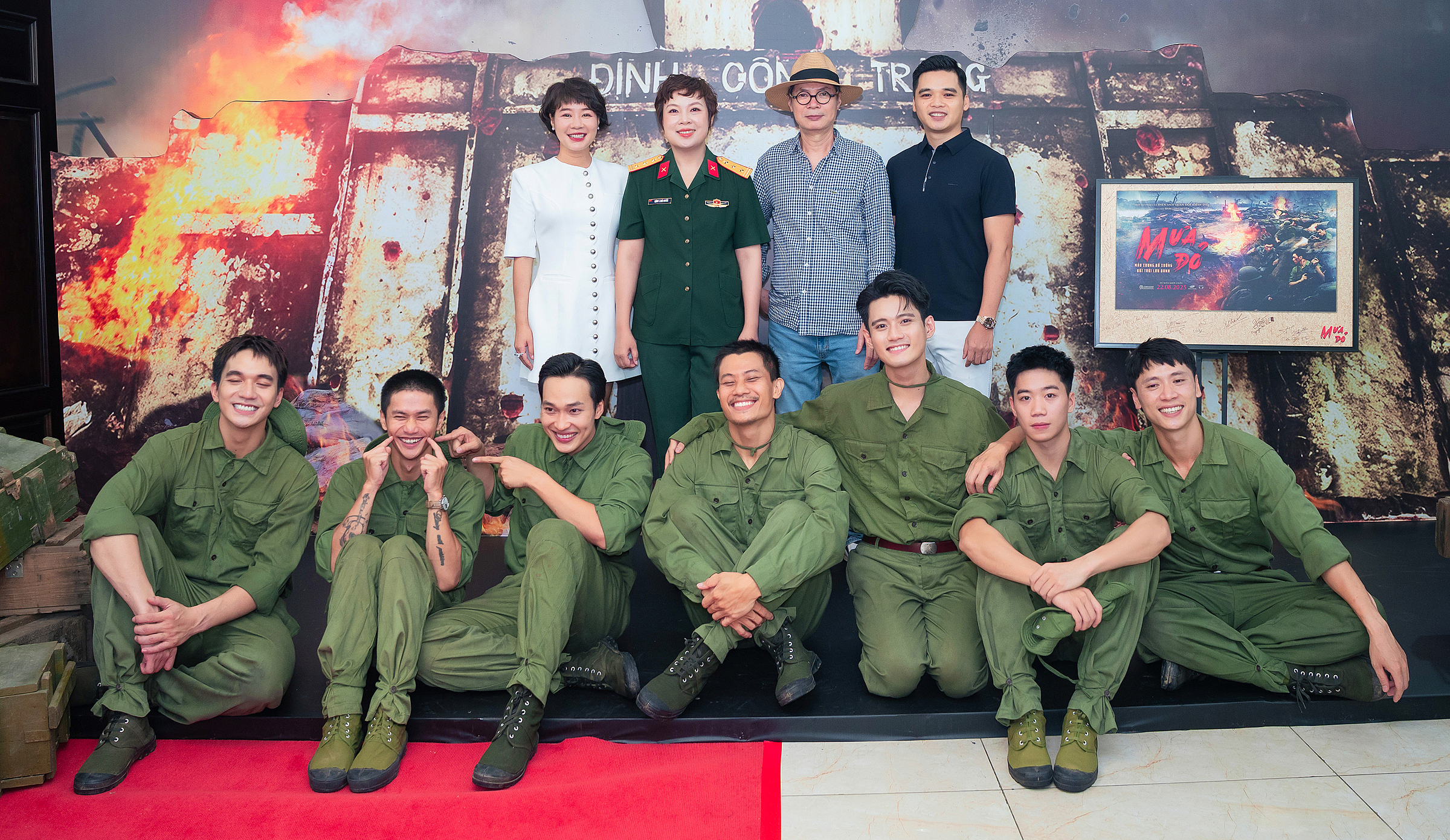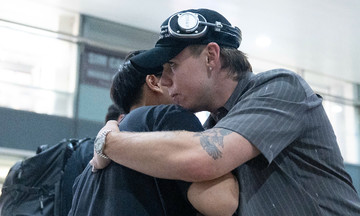During the film's introduction in Hanoi on Tuesday, July 23rd, several witnesses who participated in the 1972 Quang Tri battle were present, reminiscing about their wartime experiences. Mr. Nguyen Van Hoi, 77, head of the K3-Tam Dao Battalion liaison board, recalled that his battalion initially had 325 men. Reinforcements quadrupled that number, but in the end, only 39 survived.
"During those 81 days, over 1,000 men from our battalion died at the citadel. The citadel was large, but my comrades filled it," Mr. Hoi said.
The scene that moved him most was the soldiers crossing the Thach Han River, as it reminded him of real events: "There were days when the command announced they would send 50-70 new recruits to the battalion. Each soldier was given a 2.5-meter raincoat to wrap their belongings and weapons. We waited from night until dawn and saw a few buoys surface. My comrade and I were overjoyed and were about to jump out of the trench to welcome them when a barrage of artillery fire rained down on them. Adrift on the Thach Han River, only the cries of 'Mother!' and 'Sister!' remained. They were so young, they hadn't even known love yet."
 |
From left: Major, Hero of the People's Armed Forces Tran Trong Can, Colonel Dao Van Phe - Deputy Head of the K3-Tam Dao Battalion liaison board, Mr. Nguyen Van Hoi, 77, Head of the K3-Tam Dao Battalion liaison board. Photo: Provided by the organizers. |
Colonel Dao Van Phe, deputy head of the K3-Tam Dao Battalion liaison board, recalled his and his comrades' morale: "We knew we would die sooner or later; those who survived were lucky. Thousands of soldiers fell, never seeing the liberation day on 30/4/1975. That day, we jumped up, hugged each other, cried, and said, 'I'm alive, Mother!'."
Writer Chu Lai, the film's screenwriter and a former special forces soldier in the south, thanked his comrades who came to see the film and provided feedback throughout its production. He wrote the script in 2010 at the suggestion of a friend whose family member was a martyr in Quang Tri.
He said, "To me, the 81 days at the citadel represent one of the fiercest battles in human history. The battle had two phases: desert warfare, when the citadel was leveled, and soldiers, their clothes torn, rolled on the ground. The water warfare phase was equally arduous. 328,000 tons of bombs and ammunition were dropped. Some died multiple times, their bodies buried and then reburied after being hit by bombs. No matter how 'epic,' this film is just a glimpse."
 |
Director Dang Thai Huyen (top row, second from left) and the actors. Photo: Provided by the organizers. |
Director Dang Thai Huyen began working on the script in 2012. After several revisions, the project was approved in 2023. Last year, the crew started building sets, casting actors, and filming. The 50-hectare film set on the banks of the Thach Han River, where 85% of the film takes place, was meticulously crafted by hundreds of people. The film features many large-scale scenes, depicting the ferocity of the battle.
The explosions were handled by Thai experts and the Engineering Corps. The river crossing scenes were the most challenging. The film crew mobilized special forces soldiers and extras. For the night river crossing scenes, they built platforms underwater to minimize accidents.
The cast includes many young faces like Do Nhat Hoang, Ha Anh, Steven Nguyen, Phuong Nam, Lam Thanh Nha, Dinh Khang, Hoang Long, and Nguyen Hun. They were selected from thousands of people through casting calls in Hanoi and Ho Chi Minh City.
For the past two years, war films have gained popularity. In February of last year, "Dao, Pho and Piano" by director Phi Tien Son created a ticket-buying frenzy, earning 21 billion VND and breaking even after three months. According to the Cinema Department, this is "unprecedented" for films commissioned by the Ministry of Culture, Sports, and Tourism, which are only released in some state-owned cinemas. Bui Thac Chuyen's "Dia dao" (Tunnel), released on April 30th, grossed 172 billion VND.
Ha Thu











